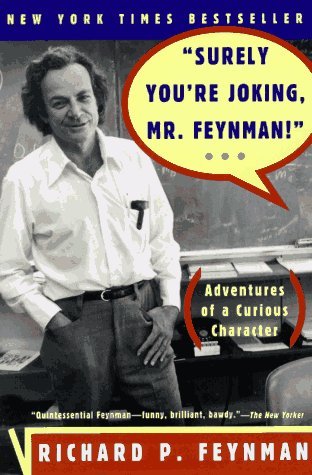I just finished a book full of game advice, written by a keen social observer passionate about sharing his knowledge with others. The author raves about his travels in Brazil, and details the triumphs and missteps on his quest to live an interesting life. No, it wasn’t A Dead Bat In Paraguay. It’s “Surely You’re Joking, Mr. Feynman,” the memoirs of noted supergenius physicist and all around player-pimp of the 20th century Richard Feynman.
Feynman boasts a rare combination of superlative intellect, fascinating perspective on life, relatively good social skills, and a great sense of humor. Throughout his life Feynman learned to play samba music in Brazil, picked up showgirls in Vegas, became an expert lock-picker, got into bar fights, learned several languages, and became a commissioned portrait artist. Oh, and he also helped create the atomic bomb and is widely regarded as one of the most prolific geniuses of the 20th century. He shares his fascinating life experiences amidst the historical backdrop of World War II and the Manhattan Project at Los Alamos.
On true genius:
“So I told Fermi I was doing this problem, and I started to describe the results. He said, “Wait, before you tell me the result, let me think. It’s going to come out like this (he was right), and it’s going to come out like this because of so and so. And there’s a perfectly obvious explanation for this–” He was doing what I was supposed to be good at, ten times better. That was quite a lesson to me.”
On his game awakening as a professor at Princeton:
“That relieved me a great deal. It explained everything. I had been telling all the girls the simple-minded, stupid truth, and I never knew what the trouble was. It was perfectly obvious that I was being shunned by one girl after another when I did everything perfectly nice and natural and was polite, and answered the questions. Everything would look very pleasant, and then thwoop –it wouldn’t work. I didn’t understand it until this woman fortunately called me a damn liar. So then I tried to avoid all the questions, and it had the opposite effect: “Are you a freshman?”
“Well, no.”
“Are you a graduate student?”
“No.”
“What are you?”
“I don’t want to say.”
“Why won’t you tell us what you are?”
“I don’t want to . . . –and they’d keep talking to me!
I ended up with two girls over at my house and one of them told me that I really shouldn’t feel uncomfortable about being a freshman; there were plenty of guys my age who were starting out in college, and it was really all right.”
On the dissociation of intelligence and productivity:
When I was at Princeton in the 1940s I could see what happened to those great minds at the Institute for Advanced Study, who had been specially selected for their tremendous brains and were now given this opportunity to sit in this lovely house by the woods there, with no classes to teach, with no obligations whatsoever. These poor bastards could now sit and think clearly all by themselves, OK? So they don’t get any ideas for a while: They have every opportunity to do something, and they’re not getting any ideas. I believe that in a situation like this a kind of guilt or depression worms inside of you, and you begin to worry about not getting any ideas. And nothing happens. Still no ideas come.
On conquering approach anxiety in Las Vegas:
“They were all beautiful, and I just love beautiful girls. In fact, show girls were my real reason for liking Las Vegas so much. At first I was a little bit afraid: the girls were so beautiful, they had such a reputation, and so forth. I would try to meet them, and I’d choke a little bit when I talked. It was difficult at first, but gradually it got easier, and finally I had enough confidence that I wasn’t afraid of anybody.”
As a small awkward kid from Long Island who had to learn social skills piecemeal, Feynman is proof that working on one’s personality trumps natural talent, and that high intelligence isn’t a barrier to having tight game.
My only negative word about the memoir is that it is a bit disjointed in time, and occasionally explains technical topics at too great a length. I had to skim some of the dense math and physics passages, but these are infrequent. The occasional intense focus on these subjects also comes off as endearing, since it demonstrated Feynman’s intense intellectual curiosity for nearly all subjects that crossed his path.
Books rarely make me laugh out loud; this one did. If there was ever a real-life inspiration for Dos Equis’s “Most Interesting Man In The World,” Feynman is it. It is highly recommended both for its entertainment value and for the lessons contained within.
Don’t Miss: What Guys Are Saying About Getting Laid In Ukraine
